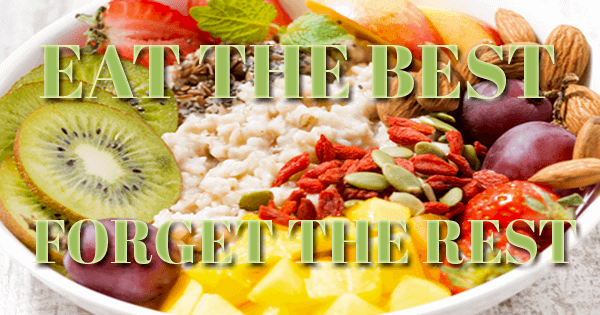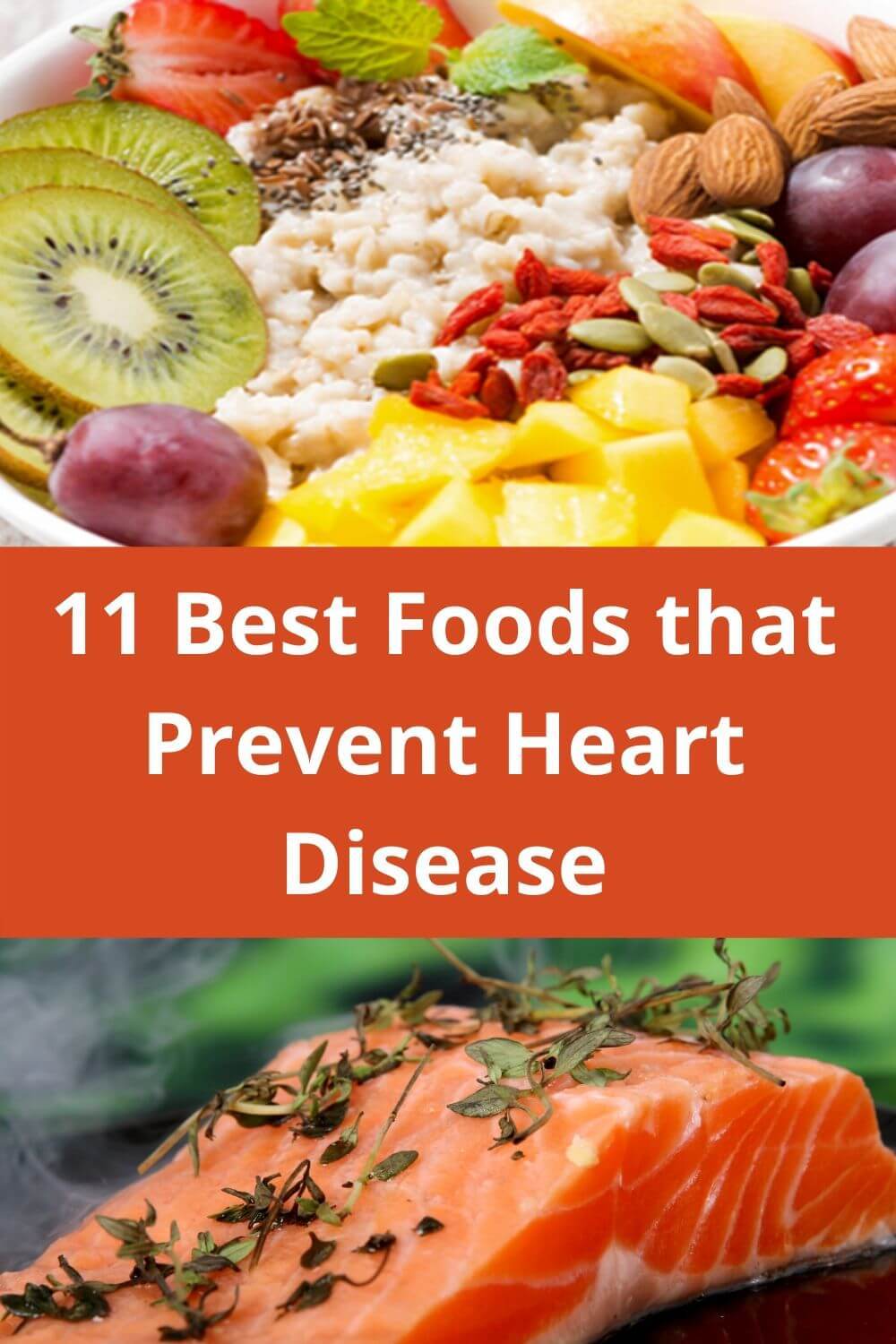Heart disease is the leading cause of death in America. Yet, the simple prevention and remedy to this disease is often overlooked because it is so simple . . . a heart-healthy diet. There are certain foods that prevent heart attacks, the condition which causes more deaths than cancer. It is important to incorporate these foods in your every day diet to keep your heart healthy.
According to Harvard Health Publications, healthy diet is so powerful that it can prevent up to 70% of heart diseases, as Walter Millet, the chair of nutrition at Harvard School of Public Health, reveals.
In that spirit, below is a list of the top 10 “superfoods” which will keep your heart healthy and pumping for a long time to come.
1. Wild Salmon
When talking about foods that ![By Timothy Knepp, U.S. Fish and Wildlife Service [Public domain], via Wikimedia Commons](https://upload.wikimedia.org/wikipedia/commons/thumb/0/0f/Atlantic_salmon_fish.jpg/320px-Atlantic_salmon_fish.jpg)
Tip: Take wild salmon as a main course twice a week to get the nutrition you need. You can find many healthy salmon recipes online. Check out some of them here.
2. Oatmeal
Now that you have a rich ![By Renee Comet (Photographer) [Public domain or Public domain], via Wikimedia Commons](https://upload.wikimedia.org/wikipedia/commons/thumb/6/67/Oatmeal_%281%29.jpg/320px-Oatmeal_%281%29.jpg)
However, it is important to not use the instant oatmeal, which usually contains sugar. Instead, choose quick-cooking oats or the traditional type.
Tip: Make oatmeal a staple for breakfast. Try mixing nonfat milk or coconut milk, oatmeal, berries of your choice and a pinch of brown sugar, then refrigerate overnight. In the morning, top it with honey and nuts and enjoy!
3. Oranges (and other Citrus Fruits)
Citrus fruits contain lots of ![By Evan-Amos (Own work) [CC BY-SA 3.0 (http://creativecommons.org/licenses/by-sa/3.0)], via Wikimedia Commons](https://upload.wikimedia.org/wikipedia/commons/thumb/7/7b/Orange-Whole-%26-Split.jpg/320px-Orange-Whole-%26-Split.jpg)
Tip: The pulp and pith (the white spongy layer between the fruit and the peel) of the orange contain pectin. So if you want to make the most of this citrus fruit, eat it as much as you can. Take it as a snack or have it in the morning with your breakfast.
Warning: Keep away from processed fruit juices. They contain high levels of sugar which brings down the effectiveness of the fruit.
4. Organic Kale
Organic Kale is the queen of dark ![By Evan-Amos (Own work) [CC0], via Wikimedia Commons](https://upload.wikimedia.org/wikipedia/commons/thumb/4/4b/Kale-Bundle.jpg/320px-Kale-Bundle.jpg)
One of the most common causes of heart disease is clogging of the arteries, which is due to plaque deposits building up. This can be prevented by consuming organic kale. This superfood contains the glucosinolate phytonutrients which triggers the protein called Nrf2.
This protein then creates a special coating in the arteries which prevents plaque from clogging them, keeping the passage clear.
So, yes . . . your mom was right about eating those dark green leafy veggies.
Tip: Eating raw organic kale is more beneficial as the nutrients are not lost due to the heat from cooking. Try organic kale as a salad, or as a snack. There are many recipes you can find on different kinds of kale chips, soups and salads!
5. Organic Broccoli
Like kale, organic broccoli is ![By David Monniaux (Own work) [GFDL (http://www.gnu.org/copyleft/fdl.html), CC-BY-SA-3.0 (http://creativecommons.org/licenses/by-sa/3.0/) or CC BY-SA 1.0 (http://creativecommons.org/licenses/by-sa/1.0)], via Wikimedia Commons](https://upload.wikimedia.org/wikipedia/commons/thumb/5/5c/Broccoli_DSC00861.png/295px-Broccoli_DSC00861.png)
One cup of broccoli will provide you with your daily need of vitamins C and K, and also contains vitamin A, folate and potassium; as well as a great source of phytonutrients (see kale).
According to Wiley Online Library, there were two studies done on the benefits of broccoli that found it can in fact help reduce the blood LDL-cholesterol.
Tip: You will gain more health advantage when eating broccoli raw, so maybe try eating it with your favourite heart-healthy dip along with other “dip-able” veggies.
6. Organic Berries
Berries are not just tasty snacks; ![By Scott Bauer, USDA ARS [Public domain], via Wikimedia Commons](https://upload.wikimedia.org/wikipedia/commons/thumb/3/31/Berries_%28USDA_ARS%29.jpg/318px-Berries_%28USDA_ARS%29.jpg)
Warning: Reason “organic berries” recommended is due to the recent finding of: Strawberries remain at top of pesticide list, report says
Tip: You could do what the women in the study did. Have at least three servings of berries per week. To make it easier, set a diet plan where you would take a bowl of blueberries or strawberries as a snack a few days a week. You can also pair them up with your morning oatmeal for a nutrient-packed breakfast.
7. Pomegranates
You can’t fight heart diseases by working on a single front. So, now that you know about the foods that lower LDL levels, flush out cholesterol, and create a protective layer to prevent plaque deposits, what about the plaque deposits already present in the arteries?
Pomegranate juice can aid in this respect. A study revealed that pomegranate juice reversed plaque buildup if the patients drank eight ounces a day for the whole year.
How does that happen? The researcher for this study, learned that pomegranate juice activates an enzyme in the body which breaks down oxidized cholesterol.
Tip: Having trouble cutting a pomegranate without making a mess?
For those who would rather read about this technique . . . simply cut off the “stem” of the pomegranate top so you can view the sections of the seeds. Carefully cut down the five yellow lines which separate the seeds. Since you’ll be cutting down the area without any seeds, there won’t be any mess.
8. Organic Beans and Other Legumes
Beans and legumes are foods that prevent heart ![By Keith Weller, Agricultural Research Service, USDA [Public domain], via Wikimedia Commons](https://upload.wikimedia.org/wikipedia/commons/thumb/e/e7/Various_legumes.jpg/160px-Various_legumes.jpg)
Legumes are rich in phytosterols and saponins, which prevent the absorption of cholesterol in the stomach. A clinical trial concluded that consuming half to two cups of beans/ legumes a day can reduce LDL (bad cholesterol), increase HDL (good cholesterol), maintain blood sugar levels, and lower blood pressure.
Tip: Here is a list of some healthy beans and legumes recipes you may want to try.
9. Potatoes (NOT FRIED)
Yes, please, no French fries.
Potatoes may get a bad rap, ![By No machine-readable author provided. Lumbar~commonswiki assumed (based on copyright claims). [Public domain], via Wikimedia Commons](https://upload.wikimedia.org/wikipedia/commons/thumb/4/4c/Potato_heart_mutation.jpg/549px-Potato_heart_mutation.jpg)
Heart pain (angina) occurs when the supply of oxygen does not meet the amount of work that the heart has to do. Calcium channel blockers work by dilating the arteries so that more blood can flow when required without over-exerting the heart. This effectively reduces blood pressure.
Magnesium is nature’s very own natural channel blocker as George Mateljan, the author of “The World’s Healthiest Foods” (my affiliate link), comments.
Tip: Here are some healthy (and delicious!) potato recipes that you can have fun making and eating at home.
10. Raw Nuts
Nuts contain heart-protecting compounds ![By Sage Ross (Own work) [CC BY-SA 3.0 (http://creativecommons.org/licenses/by-sa/3.0)], via Wikimedia Commons](https://upload.wikimedia.org/wikipedia/commons/thumb/0/06/Fancy_raw_mixed_nuts_macro.jpg/320px-Fancy_raw_mixed_nuts_macro.jpg)
According to writer Stephen Daniells, a 2006 study revealed that walnuts were effective in reducing oxidation of cholesterol and inflammation of arteries after eating fat-rich meals.
Macadamia nuts are packed with fiber and healthy fats; pistachios are rich in potassium; and pecans contain plant sterols—a substance with powerful cholesterol-lowering abilities.
Warning: Stay away from packaged roasted nuts with a lot of added salt and keep your consumption moderate. I’ve been told to not eat any more than a handful (whatever I can easily hold in one handful) of raw nuts daily.
11. Dark Chocolate
Wooohooo! I saved the best ![By Simon A. Eugster [GFDL (http://www.gnu.org/copyleft/fdl.html) or CC BY-SA 3.0 (http://creativecommons.org/licenses/by-sa/3.0)], via Wikimedia Commons](https://upload.wikimedia.org/wikipedia/commons/thumb/b/b7/Dark_chocolate_bar.jpg/320px-Dark_chocolate_bar.jpg)
The cocoa bean is said to be rich in plant nutrients called flamonoids, which as you’ve already learned works as an antioxidant. Flavanols are the main type of flavoinoid found in chocolate. I have also learned that research shows flavanols have other possible influences on our vascular health. An example offered was that is lowers blood pressure making blood platelets less sticky. Cranberries, apples, peanuts, onions, tea and red wine are also said to contain high amounts of flavanols too.
So now it’s up to you. Make your heart-healthy choices for life!
Credit for Header: image © photographer: Yulia Davidovich | Agency: Dreamstime.com






